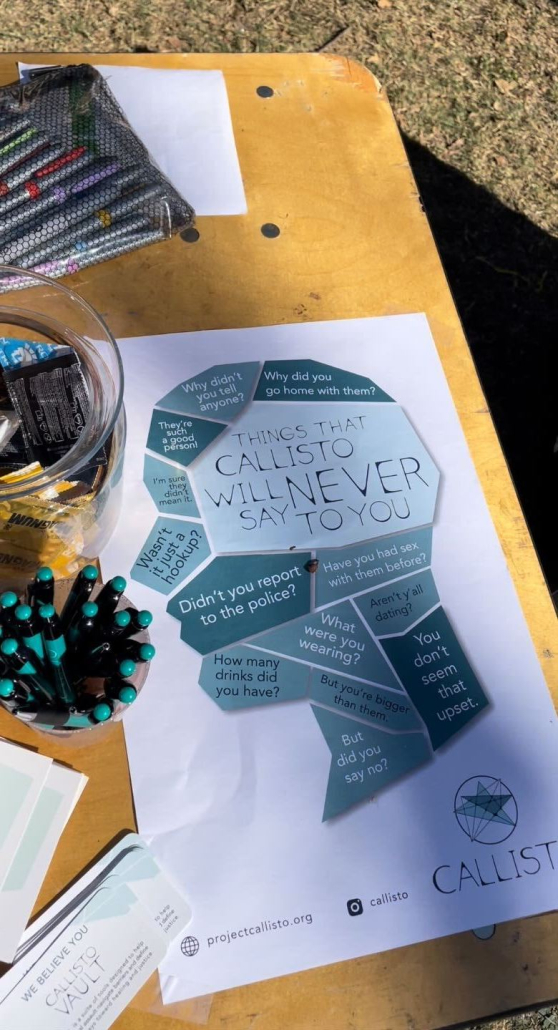New technology helps survivors of sexual assault connect and heal

As USC descends into the Red Zone — the months between the start of the academic year and November, during which more than 50% of sexual assaults statistically take place at universities — students look to a technology-based organization as a protected alternative for reporting incidents of sexual assault.
Callisto is a nonprofit organization that helps university students report instances of sexual assault and match with other survivors. It aims to defend sexual assault survivors’ autonomy by allowing students to file reports without their name or obligation attached.
While not formally partnered with USC, the third-party resource welcomes students to use its online platform and connect with a network of survivors from around 40 other universities.
The organization introduced a record vault and anonymous reporting software this year to help survivors document incidents, identify perpetrators and take action in confidence.
Amelie Schlager, a senior majoring in international relations with an emphasis in global business, is the USC Head Campus Ambassador for Callisto. She said the organization’s resources help catch offenders through a secure and confidential reporting system.
“If students want to enter into Callisto’s matching system, that can help identify repeat perpetrators across our network,” Schlager said. “If they don’t want to enter into matching, they can choose to use Callisto’s encrypted record form, which creates a secure, confidential and time-stamped record so that they can document what happened to them and then file a formal report later on.”
If the system confirms a match, all survivors involved are granted free legal options counseling. From there, they can decide whether to report the incident to the school or contact law enforcement.
Schlager said survivors have complete control over the reporting process and choosing which steps to take. She said protecting survivors’ autonomy is an integral part of the healing process.
“A big part of what happens during sexual assault experiences is that survivors feel like they have lost all of their power and lost complete control of the situation,” Schlager said. “It’s really important that we give them their power back and fully allow them to heal.”
Lindsey Walton, a freshman majoring in business administration, said she believes Callisto is a more comfortable alternative to reporting directly to the authorities or using EEO-TIX, the University’s reporting system for gender-based discrimination and harassment.
“While [Title IX] provides students an opportunity to seek justice, it doesn’t necessarily do so in the most beneficial way,” Walton said. “Students may not feel comfortable reporting, and their cases may be swept under the rug even if they do report, which is problematic.”
When students report through EEO-TIX, a response team compiles evidence in a non-confidential report. While the team considers the victim’s wants, it also considers community safety, and the reporting office ultimately holds the discretion to disclose private information. EEO-TIX also provides a list of additional confidential resources in its “Resolution Process for Sexual Misconduct” document.
Schlager said that in contrast to EEO-TIX, Callisto is entirely confidential and anonymous. It allows students to assume control over what information they report and how and when they take action.
“[Callisto] offers an alternative to the flawed Title IX reporting system and also an alternative to reporting to law enforcement,” Schlager said. “I know from peers that [it]’s a very traumatizing experience, so Callisto is a really incredible resource for USC students because it empowers survivors and allows them to seek justice on their own terms and to find their own pathways towards healing.”
Survivor support groups at USC, such as Survivor Support Community and the Student Assembly for Gender Empowerment, have partnered with Callisto to spread awareness about the project and provide student resources.
SSC president Sammie Sorsby-Jones said the reporting process is often difficult for survivors. She supports Callisto’s efforts to grant victims autonomy and bring survivors together to make the process more comfortable.
In addition to providing direct service, SSC welcomes victims and allies to foster a supportive legacy of survivors.
“I think the administration can often be so bureaucratic that it’s not as helpful as what survivors need, and I think that having a community of peers who understand what you’re going through and can be there for you is so important,” said Sorsby-Jones, a junior majoring in law, history and culture.
In a study conducted by the Association of American Universities in 2019, 31% of female undergraduates at USC said they were sexually assaulted at some point in college. Eighty-four percent of all undergraduates who experienced sexual harassment did not contact USC resources, according to the report.
Third-party reporting systems, such as Callisto, aim to mitigate fear in reporting instances of sexual assault, helping students be proactive in seeking healing and justice.
“Seeking justice is one thing … but healing is a whole different story,” Schlager said. “[Healing] requires [survivors] to feel like they can define their own pathways and can make a difference in their own life.”

